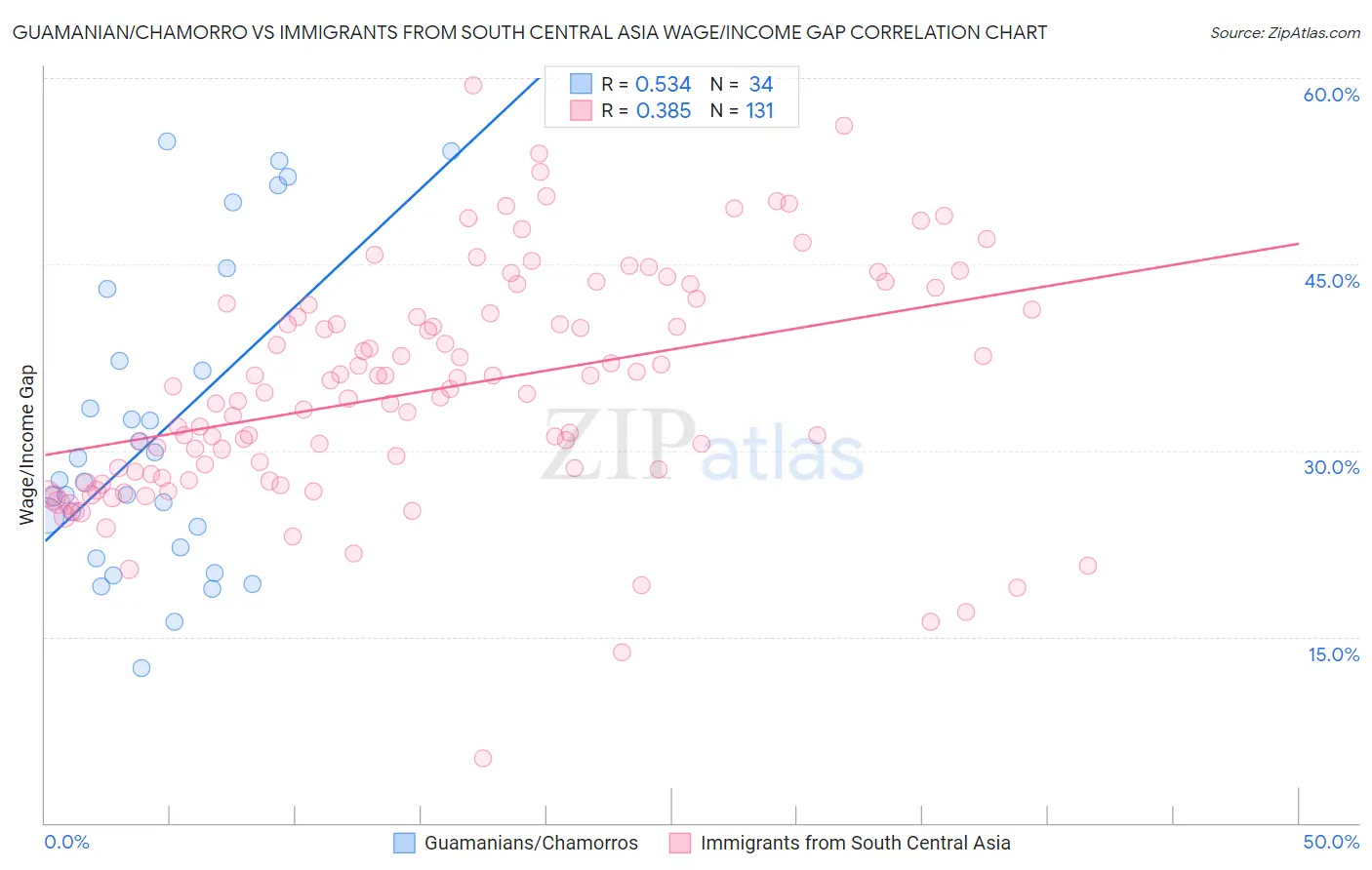Guamanian/Chamorro vs Immigrants from South Central Asia Wage/Income Gap
COMPARE
Guamanian/Chamorro
Immigrants from South Central Asia
Wage/Income Gap
Wage/Income Gap Comparison
Guamanians/Chamorros
Immigrants from South Central Asia
26.0%
WAGE/INCOME GAP
38.0/ 100
METRIC RATING
180th/ 347
METRIC RANK
29.3%
WAGE/INCOME GAP
0.0/ 100
METRIC RATING
332nd/ 347
METRIC RANK
Guamanian/Chamorro vs Immigrants from South Central Asia Wage/Income Gap Correlation Chart
The statistical analysis conducted on geographies consisting of 221,896,137 people shows a substantial positive correlation between the proportion of Guamanians/Chamorros and wage/income gap percentage in the United States with a correlation coefficient (R) of 0.534 and weighted average of 26.0%. Similarly, the statistical analysis conducted on geographies consisting of 472,660,484 people shows a mild positive correlation between the proportion of Immigrants from South Central Asia and wage/income gap percentage in the United States with a correlation coefficient (R) of 0.385 and weighted average of 29.3%, a difference of 12.9%.

Wage/Income Gap Correlation Summary
| Measurement | Guamanian/Chamorro | Immigrants from South Central Asia |
| Minimum | 12.5% | 5.2% |
| Maximum | 54.9% | 59.4% |
| Range | 42.4% | 54.2% |
| Mean | 31.4% | 34.9% |
| Median | 27.5% | 34.6% |
| Interquartile 25% (IQ1) | 22.2% | 28.1% |
| Interquartile 75% (IQ3) | 37.2% | 41.3% |
| Interquartile Range (IQR) | 15.1% | 13.2% |
| Standard Deviation (Sample) | 12.1% | 9.3% |
| Standard Deviation (Population) | 12.0% | 9.2% |
Similar Demographics by Wage/Income Gap
Demographics Similar to Guamanians/Chamorros by Wage/Income Gap
In terms of wage/income gap, the demographic groups most similar to Guamanians/Chamorros are Samoan (26.0%, a difference of 0.040%), Immigrants from Bolivia (26.0%, a difference of 0.11%), Immigrants from Serbia (26.0%, a difference of 0.19%), Immigrants from Kazakhstan (26.0%, a difference of 0.20%), and Mexican (26.0%, a difference of 0.26%).
| Demographics | Rating | Rank | Wage/Income Gap |
| Immigrants | Belarus | 52.9 /100 | #173 | Average 25.7% |
| Alaskan Athabascans | 50.0 /100 | #174 | Average 25.8% |
| Sri Lankans | 47.0 /100 | #175 | Average 25.8% |
| Paraguayans | 46.7 /100 | #176 | Average 25.8% |
| Cambodians | 45.1 /100 | #177 | Average 25.8% |
| Chinese | 42.0 /100 | #178 | Average 25.9% |
| Samoans | 38.6 /100 | #179 | Fair 26.0% |
| Guamanians/Chamorros | 38.0 /100 | #180 | Fair 26.0% |
| Immigrants | Bolivia | 36.4 /100 | #181 | Fair 26.0% |
| Immigrants | Serbia | 35.4 /100 | #182 | Fair 26.0% |
| Immigrants | Kazakhstan | 35.2 /100 | #183 | Fair 26.0% |
| Mexicans | 34.4 /100 | #184 | Fair 26.0% |
| Pakistanis | 33.7 /100 | #185 | Fair 26.1% |
| Immigrants | Indonesia | 32.5 /100 | #186 | Fair 26.1% |
| Palestinians | 29.9 /100 | #187 | Fair 26.1% |
Demographics Similar to Immigrants from South Central Asia by Wage/Income Gap
In terms of wage/income gap, the demographic groups most similar to Immigrants from South Central Asia are European (29.4%, a difference of 0.19%), Swedish (29.4%, a difference of 0.34%), Immigrants from Taiwan (29.5%, a difference of 0.46%), English (29.5%, a difference of 0.47%), and Czech (29.2%, a difference of 0.51%).
| Demographics | Rating | Rank | Wage/Income Gap |
| Hungarians | 0.0 /100 | #325 | Tragic 29.0% |
| Immigrants | Belgium | 0.0 /100 | #326 | Tragic 29.0% |
| Immigrants | Iran | 0.0 /100 | #327 | Tragic 29.1% |
| Scandinavians | 0.0 /100 | #328 | Tragic 29.1% |
| Scottish | 0.0 /100 | #329 | Tragic 29.1% |
| Germans | 0.0 /100 | #330 | Tragic 29.2% |
| Czechs | 0.0 /100 | #331 | Tragic 29.2% |
| Immigrants | South Central Asia | 0.0 /100 | #332 | Tragic 29.3% |
| Europeans | 0.0 /100 | #333 | Tragic 29.4% |
| Swedes | 0.0 /100 | #334 | Tragic 29.4% |
| Immigrants | Taiwan | 0.0 /100 | #335 | Tragic 29.5% |
| English | 0.0 /100 | #336 | Tragic 29.5% |
| Dutch | 0.0 /100 | #337 | Tragic 29.6% |
| Filipinos | 0.0 /100 | #338 | Tragic 29.7% |
| Iranians | 0.0 /100 | #339 | Tragic 29.7% |